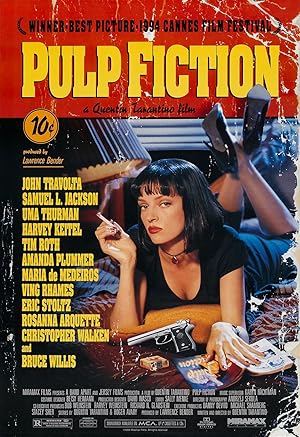Pulp Fiction
| 1994Directed by: Quentin Tarantino
Main Plot
Pulp Fiction weaves together multiple interconnected stories set in the criminal underbelly of Los Angeles. The film follows hitmen Vincent Vega and Jules Winnfield as they navigate a series of violent encounters while delivering a briefcase for their boss, gangster Marsellus Wallace. Meanwhile, Vincent goes on a date with Mia, Marsellus's wife, leading to a series of unexpected events. Another storyline involves boxer Butch Coolidge, who double-crosses Marsellus by not throwing a fight and subsequently goes on the run. As the narrative unfolds, the lives of these characters intersect in surprising ways, revealing themes of fate, redemption, and the randomness of violence. The film's non-linear structure and eclectic dialogue contribute to its unique storytelling style, making it a landmark in modern cinema.
Characters
- Vincent Vega, a hitman, navigates various criminal escapades, including retrieving a briefcase, escorting his boss's wife, and a tense diner robbery.
- Uma Thurman plays Mia Wallace, the wife of gangster Marsellus Wallace. Her overdose incident significantly impacts Vincent Vega's storyline.
- Jules Winnfield, a hitman, partners with Vincent Vega. He delivers philosophical monologues and seeks redemption after a near-death experience.
Ending Explained
In the ending of Pulp Fiction, the narrative converges as several storylines intersect. The film culminates in the diner scene where Jules and Vincent confront a group of armed robbers. Jules, experiencing a moment of clarity and transformation, chooses to spare the robbers' lives after a profound reflection on his life and choices. This pivotal moment resolves the immediate conflict of the robbery, showcasing Jules' shift from a life of violence to one seeking redemption. Simultaneously, the film's non-linear structure allows viewers to revisit earlier events, particularly the significance of choices and consequences. The final moments highlight the theme of fate and the randomness of life, as characters navigate their paths. The resolution of the diner scene emphasizes the power of dialogue and personal revelation, contrasting with the film's earlier violent encounters. Ultimately, the ending reinforces the overarching narrative of interconnected lives and moral ambiguity, leaving viewers to ponder the implications of redemption, choice, and the cyclical nature of violence. The film concludes with a sense of unresolved tension, inviting reflection on the characters' journeys and the choices that define them.
